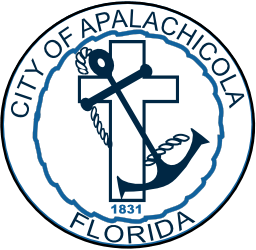Apalachicola keeps millage rate unchanged
Blessed with a significant growth in its tax base, Apalachicola city commissioners have decided to keep the millage rate unchanged at 8.3457 mills.
Because the tax base has grown from $204.9 million this year to about $236.5 million in the upcoming 2023-24 fiscal year, the city will have about $1.92 million in ad valorem tax revenue, roughly $305,000 more than it had this year.
Had the city commissioners gone with the 7.2299-mill rollback rate, which would be about 15 percent less and which keeps ad valorem proceeds unchanged, the city would have had about $1.62 million in tax revenue to spend.
By a unanimous vote at its first budget hearing Sept. 13, commissioners adopted a general fund that will be about $4.04 million, and enterprise funds – of mainly water and sewer receipts – of about $3.7 million. Add to that more than $2 million in carryover monies from the current fiscal year, and the city budget totals about $9.42 million.
At an earlier budget workshop, Commissioner Despina George took an active role in prioritizing close to $2 million in capital improvements, arguing to her colleagues that it was important to address priority items that were placed in previous budgets but not yet acted on.
Included in the upcoming budget will be spending about $590,000 on capital expenditures for the water department. This includes $250,000 for fire hydrants, after two years without any replacements, as well as $162,000 for an inflow and infiltration study. In addition, the city will be spending about $182,000 in debt payment on its water bond as well as for its radio-read metering system.
In terms of its wastewater capital outlays, the city plans to spend about $600,000 on them, including about $400,000 on flovac vacuum sewer needs, much of that carried over from this year’s budget.
In addition, the city will spend about $422,000 on debt payments for the wastewater department, which includes a roughly $371,000 annual payment to the state revolving loan fund from which the city borrowed heavily in past years.
George has proposed a plan to retire that debt completely, which would eliminate the monthly sewer user (SUF) fee charged to both businesses and residents. The city commission has not killed that idea entirely, since it could still use ARPA (American Rescue Plan) monies to offset expenditures within its budget to achieve the elimination, either entirely or in part, of these SUF monthly fees tacked on to water bills.
With the support of fellow commissioners, George argued for the elimination of about $412,000 in proposed vehicle purchases, which included removing an excavator and trailer for the water department; and three trucks proposed for the wastewater department, the city administration and for public works.
Also funded in next year’s budget, also out of the large carryover from the current fiscal year, are $136,000 for cost overruns for the Leslie Street repair, $114,000 for cost overruns to the Bay Avenue seawall project, and $250,000 for a match to a grant for a new African-American History Museum to be built adjacent to the Holy Family Senior Center.
Included in the proposed 2023-24 budget are healthy pay increases for city workers, which include cost of living increases for each of them as well as, in some cases, increases based on the Evergreen salary study issued a couple years ago.
As a result, the city manager’s salary will rise by about $11,400, to roughly $84,500, plus benefits. The police chief’s pay will rise by about $31,000, to about $95,700, and the two lieutenants will each be paid about $16,000 more, to roughly $51,000. The public works superintendent’s pay will rise by about $15,000, too close to $66,000. The librarian’s salary will rise from $47,300 to about $52,000.
“I was pleased we are able to re-allocate capital improvement money to cost overruns on Leslie Street,” said George. “I do remain concerned about the integrity of (the accounting) numbers, especially in view of continued problems with incomplete data for completing the audit for the last fiscal year.
“The commission decided to continue to grow the operating revenue,” she said, estimating that the pay increases would total about $280,000 more in overall payroll costs.
“That’s close to the increase in ad valorem taxes (between the adopted millage and the rollback rate),” George said. “We continue to have one of the highest ad valorem tax rates of any municipality. We also burden individuals and businesses with the SUF. And in each succeeding year we’ll have to meet that amount of expenditures.”
George’s fellow commissioners voiced support for the employee pay increases.
“We have reduced the millage rate down (in recent years) after it was held so high for so long,” said Commissioner Adriane Eilliott at the budget workshop. “We need to make sure we’re going forward with Evergreen by increasing the salaries of employees. We need to have a plan to continue that step implementation. Otherwise we’re laying the ground for a mutiny and sowing discord among the ranks.
“I cannot stress enough how much we need to go forward with this,” she said.
At the budget hearing, Mayor Brenda Ash and Commissioner Anita Grove both underscored Elliott’s position.
“I too would love to reduce the millage rate,” said Grove. “We need to focus on keeping the positions we have. It’s time we double down and reinvest in city staff.”
Ash said that “we’ve not invested in our staff in such a long time. We can’t continue to put it off. Without staff we can’t fully operate the city effectively.
“Unfortunately this is where we are in the economic society we live in right now,” she said. “I would like to have gone to roll back the millage rate but unfortunately I don’t see where we do that right now.”
Following the budget hearing, the commissioners moved into a special meeting, where they voted to reinstate elected officials, as of the start of the fiscal year Oct. 1, as a class eligible for the city’s health insurance.
As it stands now, Elliott is the only commissioner who will benefit from the change, which will add about $5,000 to the city’s cost of funding the commission. The mayor makes an annual salary of about $6,000, while the commissioners each bring home about $5,200 each year.
Commissioner Donna Duncan, a lawyer in private practice, said she may be interested in looking into obtaining the city’s health insurance as well. “It depends,” she told Finance Director Mark Gerspacher. “If it’s better, it’s possible but I would have to look at it and see.”
George was the only commissioner to oppose the motion made by Elliott, and seconded by Grove, to reinstate the health insurance coverage for commissioners.
“I pushed to have the class eliminated in 2020 because I think that health insurance should be for full-time employees and not elected officials,” George said. “Also it could create a significant cost in the future as there’s turnover in the commission.
“Having the insurance available as a class makes elected officials ineligible to participate in the federal health care marketplace, which could be less,” she said.
“Health care is a very important benefit for all people and should be available to all people,” said Ash. “Even though we may not be sitting in an office five days a week, eight hours a day, we are still working on a regular basis, even after hours.
“The options available for you and I may not be available for others,” she said. “I do not take lightly what you four bring to the table. It’s not that we take home a $10,000 salary. It’s a reasonable service we give back to the citizens, and if adoption is available it should be given,” Ash said.
Grove noted that when she joined the commission in 2018, she took the health insurance coverage that was offered her by the city, although she personally covered the cost of paying the premium.
The budget hearing also was the venue where Gerspacher announced he was leaving his job as finance director. “I want to thank all of you,” he said. “I just got an opportunity that was too good to pass up.”




Meet the Editor
David Adlerstein, The Apalachicola Times’ digital editor, started with the news outlet in January 2002 as a reporter.
Prior to then, David Adlerstein began as a newspaperman with a small Boston weekly, after graduating magna cum laude from Brandeis University in Waltham, Massachusetts. He later edited the weekly Bellville Times, and as business reporter for the daily Marion Star, both not far from his hometown of Columbus, Ohio.
In 1995, he moved to South Florida, and worked as a business reporter and editor of Medical Business newspaper. In Jan. 2002, he began with the Apalachicola Times, first as reporter and later as editor, and in Oct. 2020, also began editing the Port St. Joe Star.